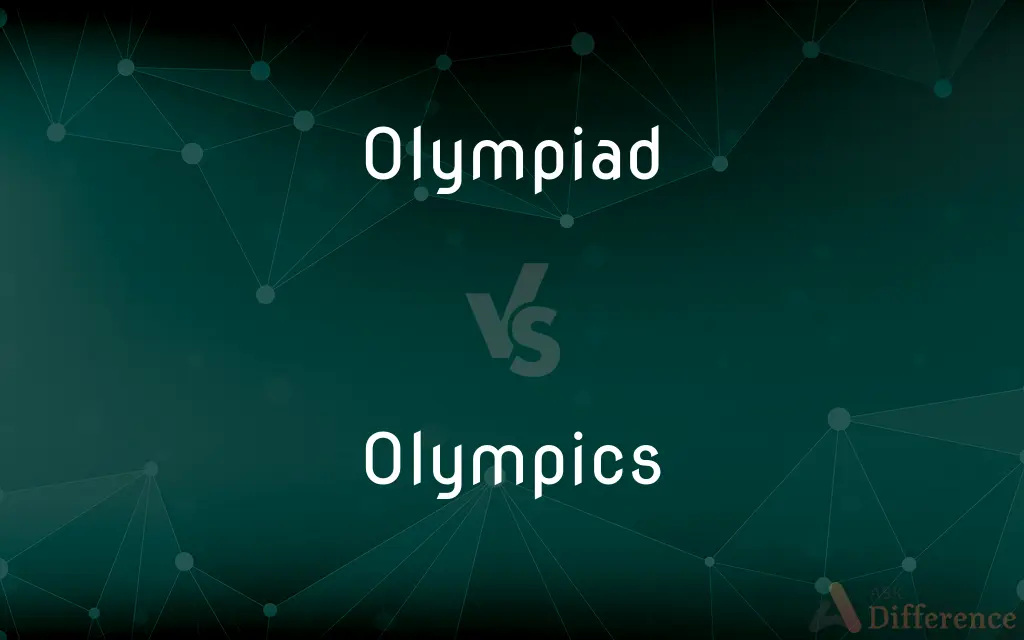Olympiad vs. Olympics — What's the Difference?
By Fiza Rafique & Urooj Arif — Updated on March 6, 2024
An Olympiad refers to a period of four years between Olympic Games, used historically for dating events, while the Olympics are a global sports competition held every four years, featuring a variety of sports.

Difference Between Olympiad and Olympics
Table of Contents
ADVERTISEMENT
Key Differences
An Olympiad is a term that originally signified a period of four years, anchored by the Olympic Games in ancient Greece, serving as a chronological measure. This term has evolved to signify any four-year period between the games, often used in historical contexts or in reference to the modern Olympic cycle. In contrast, the Olympics refer to the international sporting events themselves, comprising the Summer and Winter Games, where athletes from around the world compete in various sports disciplines.
While the concept of an Olympiad comes from ancient Greece and was primarily a timekeeping method, the modern Olympics are a celebration of global unity, athletic excellence, and peace through sport. The Olympics are organized by the International Olympic Committee (IOC) and host both summer and winter sports competitions, alternating every two years within the four-year cycle of an Olympiad.
The term Olympiad is now sometimes used in a broader sense to refer to various international competitions in specific fields, such as mathematics or science, but these uses maintain the original notion of a set period or event. The Olympics, on the other hand, specifically denote the series of athletic competitions that draw participants and viewers worldwide, emphasizing physical achievement and international camaraderie.
Olympiads as a measure of time are less commonly referred to in everyday conversation, mainly appearing in historical or academic contexts. The Olympics, however, are a widely recognized and celebrated event, anticipated by millions for the display of sporting prowess, the coming together of cultures, and the stories of determination and triumph that emerge.
In essence, the distinction between an Olympiad and the Olympics lies in the former's role as a measure of time or a specific type of competition in non-sporting fields, and the latter's function as a global sporting event celebrating athletic skills and international unity.
ADVERTISEMENT
Comparison Chart
Definition
A period of four years between Olympic Games
International sports competition held every four years
Origin
Ancient Greece as a timekeeping method
Ancient Greece, revived in 1896 as a global sports competition
Modern Usage
Reference to the period or specific competitions in fields like math or science
Refers to the major international sporting event
Frequency
Every four years, marking the cycle between Games
Held every four years, with summer and winter games alternating every two
Main Focus
Time period or academic/scientific competitions
Athletic competitions across various sports
Organized by
Various organizations for non-sporting Olympiads
International Olympic Committee (IOC)
Cultural Significance
Less in the public eye, more academic or historical
Widely celebrated and recognized for promoting peace, unity, and athletic excellence
Compare with Definitions
Olympiad
A four-year period used historically for dating, starting from the Olympic Games in ancient Greece.
The first modern Olympiad began in 1896.
Olympics
A global sports competition featuring a wide range of sports, held every four years.
The Summer Olympics feature track and field as a key sport.
Olympiad
Refers to various international competitions in specific academic fields.
The International Mathematical Olympiad (IMO) is held annually within this four-year cycle.
Olympics
Alternates between Summer and Winter Games every two years within the four-year Olympiad.
The Winter Olympics showcase sports like skiing and ice skating.
Olympiad
Used in educational contexts to describe specific competitions.
The Science Olympiad fosters STEM education among high school students.
Olympics
Symbolizes global unity and peace through sports.
The Olympic Games feature the Parade of Nations during the opening ceremony.
Olympiad
Symbolizes a measurement of time in historical contexts.
The ancient records often reference events by the Olympiad.
Olympics
Governed by the International Olympic Committee (IOC).
The IOC decides the host cities for the Olympics.
Olympiad
Represents the period leading up to the Olympics.
Athletes undergo intense training during the Olympiad before the Olympics.
Olympics
Athletes from around the world compete for medals and national pride.
Winning an Olympic gold is considered the pinnacle of an athlete's career.
Olympiad
An Olympiad (Greek: Ὀλυμπιάς, Olympiás) is a period of four years associated with the Olympic Games of the Ancient Greeks. Although the Ancient Olympic Games were established during Archaic Greece, it was not until the Hellenistic period, beginning with Ephorus, that the Olympiad was used as a calendar epoch.
Olympics
See Olympic Games.
Olympiad
An interval of four years between celebrations of the Olympic Games, by which the ancient Greeks reckoned dates.
Olympics
The modern revival of the ancient games held once every 4 years in a selected country
Olympiad
(Sports) A celebration of the modern Olympic Games.
Olympiad
Alternative case form of Olympiad, q.v.
Olympiad
A period of four years, by which the ancient Greeks reckoned time, being the interval from one celebration of the Olympic games to another, beginning with the victory of CorŒbus in the foot race, which took place in the year 776 b. c.; as, the era of the olympiads.
Olympiad
The quadrennial celebration of the modern Olympic games; as, the first Olympiad (1906). See Olympics.
Olympiad
One of the 4-year intervals between Olympic Games; used to reckon time in ancient Greece for twelve centuries beginning in 776 BC
Olympiad
The modern revival of the ancient games held once every 4 years in a selected country
Common Curiosities
What is an Olympiad in history?
An Olympiad is a period of four years between the Olympic Games, used in ancient Greece for dating purposes.
How is an Olympiad different from the Olympic Games?
An Olympiad refers to the four-year period between the Olympic Games or to specific academic competitions, whereas the Olympic Games are the actual international sporting events.
What is the purpose of the Olympics?
The purpose of the Olympics is to bring together athletes from around the world to compete in various sports, promoting global unity, peace, and the spirit of competition.
What sports are included in the Olympics?
The Olympics include a wide range of sports, from track and field and gymnastics to skiing and snowboarding, depending on whether it's the Summer or Winter Games.
Can Olympiad refer to competitions other than sports?
Yes, Olympiad can refer to international competitions in academic fields, such as mathematics or science.
Who organizes the Olympics?
The International Olympic Committee (IOC) organizes the Olympics.
Why are the Olympics held every four years?
The four-year cycle, or Olympiad, is a tradition that dates back to ancient Greece and is intended to give athletes time to prepare and qualify for the competitions.
How often are the Olympics held?
The Olympics are held every four years, with the Summer and Winter Games alternating every two years.
Are Olympiads and the Olympics related?
Yes, both terms originate from the Olympic Games in ancient Greece, but they refer to different concepts: one to a period of time or academic competitions, and the other to the sporting event itself.
Can professional athletes compete in the Olympics?
Yes, professional athletes can compete in the Olympics, although rules regarding professionalism vary by sport and over time.
What is the oldest sport in the Olympics?
Athletics (track and field) is considered the oldest sport in the Olympics, being part of the ancient Olympic Games.
How are host cities for the Olympics chosen?
Host cities are chosen through a bid process, where cities submit proposals to the IOC, which evaluates and selects the host several years in advance.
What is the significance of the Olympic flame?
The Olympic flame symbolizes the continuity between the ancient and modern games and represents the light of spirit, knowledge, and life.
How do athletes qualify for the Olympics?
Athletes qualify for the Olympics through their performance in designated Olympic trials or according to the standards set by their sport's international federation.
Share Your Discovery

Previous Comparison
Painting vs. Sculpture
Next Comparison
Mile vs. MoleAuthor Spotlight
Written by
Fiza RafiqueFiza Rafique is a skilled content writer at AskDifference.com, where she meticulously refines and enhances written pieces. Drawing from her vast editorial expertise, Fiza ensures clarity, accuracy, and precision in every article. Passionate about language, she continually seeks to elevate the quality of content for readers worldwide.
Co-written by
Urooj ArifUrooj is a skilled content writer at Ask Difference, known for her exceptional ability to simplify complex topics into engaging and informative content. With a passion for research and a flair for clear, concise writing, she consistently delivers articles that resonate with our diverse audience.















































